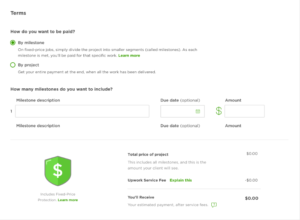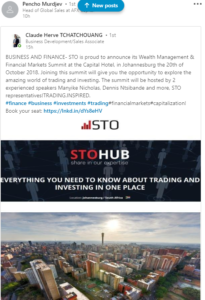“Mind The Gap!” – The life and times of a man on the move Episode 17
Upwork for your marketing, what the next FX platforms may look like, affiliate-based vulgarity, and South Africa’s FX boom heralds an unwelcome visitor

In this weekly series, I look back on what stood out, what was bemusing, amusing and interesting during my weekly travels, interesting findings within the FX industry and interaction with an ever-shrinking big wide world. This is purely observational and for your enjoyment.
Monday: Hiring? Upwork is the big deal
You can lead a horse to water, but you cannot lead a hipster to work. Work and hipsters are akin to two horizontally opposed magnets with the repelling fields facing each other.
It is very easy to be drawn into the fashionable, marketing-over-substance efforts of many design and digital marketing companies these days, or to be beaten back by the buzzword-infused, overtly trendy ‘newspeak’ that they commonly learn whilst loitering in an ungainly fashion in coffee bars rather than studying or applying themselves to the actual science of coding and internet topography that they purportedly represent.
This Monday the difference between genuine developers and web programmers and the falsities of brand-based time wasters became very clear, and it is important to put digital marketing – an aspect very much instrumental to the retail online electronic trading industry – into two distinct categories.
The first category represents the plethora of online agencies with overtly stylized websites to match their overtly stylized facial hair, ill-fitting jeans, indiscreetly colored sneakers and array of absurd tattoos. This type of firm is no good whatsoever for our paradoxically conservative business sector.

Retail FX firms want instant traction, immediate access to new customers and to be able to make changes to campaigns or creatives very quickly without any artistic dreaming.
In this fiercely competitive sector, bottom line is everything. Having looked at the types of digital marketing agencies that exist in areas which are literally peppered with self-obsessed 20-somethings whose parlance borders on the arrogant, such as Melbourne or Berlin, where beards are as uniform as the faux Australian dialect which accompanies said beards, my deduction is that most of these firms with trendy names and a ‘co-working’ space atmosphere are quite simply hot air.
The majority will not get your work done, very few do a full week’s work, and are too busy yogic flying in Goa or campaigning for the prohibition of motor vehicles whilst perusing over the different types of mung beans in the local fair trade market to concentrate on deadlines or accuracy.
Thus, digital marketing, by and large, is a massive disguise for ineptitude and idleness and most agencies are worth avoiding.
The second category, and the one that should be followed by retail FX firms is Upwork.
Upwork is a network for freelance software engineers and web designers, many of which are either sole traders working from home or small networks of individuals with a collaborative enterprise, and is quite simply brilliant.
The demographic of the operatives who list themselves as freelancers on Upwork is quite different from the absurdities of the ‘high street’ digital marketing hot air agencies.
There are no buzzwords or childishness, and the vast majority of the freelancers hail from backgrounds which do not involve spending months at a time during important career development years ‘peacing out’ in the Amazon and avoiding soap.
Most are based in Asia, the Middle East, Russia, Britain, North America or the Indian Subcontinent and are genuinely experienced computer software engineers with the work portfolio to prove it. There are no fixed contracts and companies can pay via an Escrow account held by Upwork itself until work has been carried out, the payments then being disbursed to the freelancers on a weekly or twice monthly basis.
Digital marketers charge between $25 and $50 per hour and have to complete work on time otherwise they make no living.
It is a safe, cheap way to get the results that matter most in the FX industry and with a rolling relationship with a reliable freelancer, quick changes can be made on the spot and efficiently. The platform even has a chat window where conversations can be had directly with the freelancer.
Ideal for the retail FX world, and a massive money saver. If I were a small FX broker, I’d outsource the entire Ad Manager and creative campaign management to Upwork freelancers.
Tuesday: Sending payments to China, or into a hole in the Great Wall
It is most certainly becoming harder and harder to do international business with Chinese partners, which in my opinion is a travesty.
China is a well organized commercial powerhouse which, holistically, has managed to master the absolute art of creating a vast national business infrastructure headed by an astute central government, the entire corporate structure of the nation resembling a hewn-from-granite single-component bastion of efficiency.
The nation that powers the entire world in every imaginable business (how many items of different types are within your immediate reach that have a tag reading Made in China?) via a vast export enterprise has a communist, isolationist government.

An oxymoron for sure, but that’s China’s genius. It is a country that created its own world within a world, and is protecting it with an iron fist in a velvet glove.
Global deals are done at government level only, and import and export is strictly forbidden, yet we all want Chinese goods, Chinese financial services and Chinese partnerships to drive western business into the tightly managed system.
The government’s all-seeing-eye knows everything. The entire banking and payments system is owned by the Communist Party of China and every business transaction in every sector is recorded to the point where the government knows every click of every keyboard, however there has been some degree of leniency toward partnerships with overseas firms as long as the business being paid for and service provided is being done inside China where it can be monitored.
This Tuesday, it became patently apparent that this is now changing. Speaking to Standard Chartered Bank, which is the official handler of international SWIFT payments for China Merchants Bank, I was made aware of some very important issues.
Standard Chartered may well have its origins in colonial South Africa, however during the colonial period it became the issuer of central bank currency in the equally colonial Hong Kong, and retains that contract to this day.
Standard Chartered is the gateway between SWIFT payments from your corporate bank account anywhere in the world when making transfers to customers or suppliers in China which hold their accounts with China Merchants Bank.
This has always in the past been a very smooth operation, and usually, if you’ll pardon the pun, swift.
Not anymore, however. Using many online banking portals, there are usually a restricted number of characters for the payee’s name, hence it is common practice to shorten words like “Information Technology” to “IT” or “Educational Services Company” to “Education co”, a practice which is totally acceptable in free market transfers.
In China, if one character is not correct, the corresponding bank holds the funds in a central account until an instruction by the sender is provided to amend it to the correct and exact recipient name, however just try getting that message through.
The SWIFT system is an interbank standard which was designed to be able to trace and ensure correct delivery of payments between international banks, however if there is one thing China hates, it is SWIFT. The very functionality of it is anti-communist and facilitates global business with ease, something that runs completely counter to communist ideology and the capital controls which go hand in hand with far-left politics.
Thus, my investigations led me to speak to some senior banking executives in Edinburgh, within Lloyds Bank’s international payments division, who explained to me that Standard Chartered, although well and truly western in corporate structure, and despite their cast in stone agreement for SWIFT settlement with Lloyds Bank, will absolutely refuse to reply, respond or give status updates on SWIFT payments being handled by Standard Chartered to send to China Merchants Bank.
The upshot? You will lose your money as it will be locked indefinitely in a holding account at China Merchants Bank, and even if you take a unique identifier to China and go to the receiving bank’s international payments division, the response will be akin to an octopus spraying ink into the water in front of its predator as it darts off in an indeterminate direction.
My advice to all brokers who work with suppliers in China for branding items, rollups, conference materials, marketing or offline venues is to either use UnionPay International or WeChat Pay.
At least these are Chinese, and they bypass the banking system entirely, meaning that the recipient can simply locally withdraw the funds to their local Chinese bank account, making it a payment from a Chinese entity to a Chinese entity.
Anything else, quite simply, will lose you your capital.
Wednesday: Spread betting firms and the dinosaur effect
Wednesday’s 4.00am start resulted in a very interesting conversation with a long standing colleague of mine in Australia, with several risk management positions at APAC FX brokers on his resume.
This particular professional, who is as old and hackneyed as I am, has over 25 years institutional FX experience. He told me “Today, it is all about the future platforms in todays market space. R&D in specific areas is the key.” He is right indeed. As I have said before, a quick journey on the London Underground will expose any traveler to advertisements aimed at a direct retail audience such as II or The Share Center, ingenuities such as Robin Hood and banking platforms like Revolut. Not an MT4 lead marketing exercise in sight.
My pal said “I was looking at how digital exchanges are now allowing both fiat and crypto currency to trade CFD-FX margin derivaitives. This seems to be the future for multiple reasons, those being that it is for mostly retail traders who value fund security, P2P pricing [no spread], whilst operating with a low cost business model. Once the contract specification is in smart contract, no dodgy funny business by the broker can occur, such as trade cancelation or intentional slippage.”

“Andrew, watch this space. As you pointed out just last week, TigerWit is very interesting, as is Coinexx, Level0, which have the edge in their structure to outfits like Thinkmarkets or Larson Hotz. I have also been thinking that BitMex, openledger and OX, are the sort of general representatives of the direction as tehy are more fundamentally a new entrant yet to appear.”
As far as payment technology is concerned, my learned colleague said “With paytech, the interest in the business model that offers derivative trading in financial instruments and sports betting seems to be attracting some financial institutional money, however I do not understand why so many spreadbetting companies seek soccer, yatching, or car racing sponsorships or associations at huge cost, if there is not some connection to trading financial derivatives.”
Looking at the establishment, he said “What is happening with the UK darlings in CFD spread bet institutions, such as CMC and plus500 as prices sink like the Titanic? Mr Cruddas seems to be running for a Tory politician post with all his advertising of his personality here in the Antipodes at least [although the ANX Etrade tie up could be the catalyst.”
“Maybe CMC will be up for sale, maybe run by a successor again, although Doug Richards was a dud. Peter Cruddas has been saying he wants his clients to make money, so how can CMC create more earnings if clients make money? A reduction in B-Book earnings replaced by financing, spread and interest on deposits? I am not sure that any restructure to clients making money can occur, simply becuase the retail wont get the signals. Technical trading as we know it is misunderstood and often futile, but that is another discussion” he said.
Signing off at 5.00am, his analysis is that the whole thing is “an aspirational statement more for regulators and onboarding new clients and therefore a wolf in sheeps clothing.”
I personally do not share such an apocalyptic view at all. Yes indeed, the newcomers are fascinating, especially in highly developed areas such as England or Australia, but if any retail firms will survive it is the big, publicly listed giants with their own trading infrastructure, such as Swissquote, IG, CMC, Hargreaves Lansdown, and on the privately traded side, Saxo Bank.
All have the funds and the capacity to expand their product range in house and have the benefit of 30 years of experience in developing retail platforms. There is no reason why the ultra-cool and highly modern retail platforms of tomorrow cannot carry an IG or Saxo logo. Thus, I agree with my pal that evolution is most certainly coming in from outside our industry, however those best positioned to embrace it and compete with it are those who invested in their own platform and trading environment in the first place.
Thursday: Affiliate conferences. Vulgarity personified
On Thursday, I was sent some interesting and rather alarming imagery from the recently held affiliate marketing conference in Lisbon, Portugal.
The photos were sent to me by a marketing executive from a retail brokerage in Cyprus, who often exchanges interesting anecdotes with me. He said “I need a shower after rubbing shoulders with the specimens in here!”
Amusing turn of phrase, but far from amusing when looking at the reality that surrounds such ancillary services that are being relied upon extensively by small to medium sized retail FX brokerages.
“All I can see everywhere is dirty money” he said. “I cannot support this, not by a long way.”
I have long held the opinion that these affiliate marketing entities and the often dubious individuals who operate them do not belong in the same category as any form of fintech or online financial services industry. It is often steeped in gaming, adult entertainment and in some instances pyramid schemes in which ‘snake oil salesmen’ drive traffic to sites for CTR and hard sales conversion.
This is not what the financial sector is about, and therefore the affiliate marketers will always be the darling of the fringe businesses who will chop and change from gaming to white label binary options, to MT4 white label, then pack up their temporary office and run away.

Sadly, my informer explained that there were some familiar faces at the conference, including a lawyer who is not renowned for his subtlety, whose business specializes in establishing FX and binary brokers in offshore jurisdictions. Why would affiliates be so important to such a professional of the corporate legal industry? Hmm.
I asked the attendee if he had ever wondered why these affiliate conferences are never held in regions which are largely associated with the financial services or electronic trading industry, and why they are often in relatively lawless, unaligned regions such as Portugal or Spain.
He said “that is actually a very good point.” Can you imagine attempting to attain a business visa to enter Australia or the United States to invite international people who run ponzi schemes (in the eyes of ASIC or the NFA) outside their jurisdictions?
Then a quick five minute questioning at the airport would result in “Hello sir, What are you here for? Do you have a visa for this particular event? No? Goodbye sir.”
North America or Australia would never allow it. Britain, which does not require visas, would still take a dim view if a large affiliate event such as this was held. You’d get away with hosting such an event, but it would be all over the newspapers “Crooks den in London” for example, Kelvin McKenzie style.
It would be all over the consumer protection programs, in the papers and the rowdiness outside would not be tolerated by the City Police or local businesses.
We both agreed that most civilized countries with well developed financial markets structures and responsibility toward customers do not allow vast affiliate networking conferences which drive inexperienced members of the global public to small offshore brokers via aggressive campaigns. It belongs in the world of gambling, and in many nations, gambling = vice.
Signing off, he said “It belongs in Magaluf or Agia Napa.” That might be funny, if it wasn’t for the fact that Agia Napa is under CySec’s jurisdiction and these days, under MiFID II and EMIR, brokers need to be able to prove the quality of where they acquired and onboarded clients if it was an IB or affiliate!
Friday: Whilst on the subject of events……
South Africa continues to be a region which is garnering tremendous interest from the retail FX business, however the institutional sector is now looking very seriously at it.
The problem with it is that even though the country is a very well organized center of financial markets and has been for hundreds of years, dating back to the initial commodity and raw material trading infrastructure installed by the Dutch East India Company, the banking system installed by the British under colonial rule, which led to Johannesburg Stock Exchange being one of the most prestigious executing venues in the world as it was the pinnacle of trading in the world’s most resource rich nation.
This remains today, and Johannesburg’s highly westernized and well regulated financial services industry bears more relation to that of Australia than it does of any other African nation.
With regulators clamping down (unfairly or otherwise) in Europe, ASIC’s reluctance to issue new licenses, and only the very well capitalized being able to access the US (welcome back, IG Group!) it certainly seems that South Africa is now popular.

Of course, HotForex, IG, CMC, Saxo Bank and many other large firms are very active in South Africa, and have been for many years, however there is a flood of newcomers wading in to capitalize on the good structure and untapped new niche markets such as wealth management.
So why is there a problem?
Quite simply, South Africa’s relatively good reputation combined with its market naivety are leading some troubled firms to enter. At the recent Wealth Management and Financial Markets Summit in Johannesburg, who should be making a big splash but STO.
In this LinkedIn advertisement, STO claims to be offering the futuristically named STOHUB, which purports to be able to allow investors to manage all their investments from one place.
A great attempt at smoke and mirrors indeed. STO = Super Trading Online, which quite simply equals AFX Group, and AFX Group has certainly been managing all of its ‘investments’ from one place recently!
AFX Group’s profit sharing antics got the firm into extremely hot water in its home markets, as Esther Du Val, the trustee for the bankruptcy of Gallant Capital Markets has been petitioning for the bankruptcy of AFX Group and STO for some time. We reported extensively on this at the time, and subsequently the firm has been doing its best to evade the matter. Last week, sister company DirectFX (same owner as AFX Group) went bankrupt and had its license canceled by ASIC in Australia, and to top that off, AFX Group cannot pay its legal counsel for extensive legal services to fight this case, resulting in the termination of the contract by said counsel.
AFX has been ignoring any requests for money by the counsel, however the firm is still operating from Cyprus and London.
By attempting to show itself as a major force and enter a new and ripe market such as South Africa, the brazen attempts to avoid the inevitable and forge ahead are visible.
I have huge hopes for South Africa. Every time I am there (which is often) all I see is massive opportunity and brilliant business ethic. Let’s not let flies in the ointment spoil it.
Wishing you all a great week ahead!









